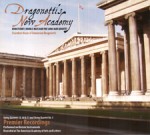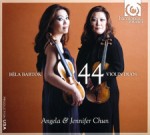Column Name
Title
Dragonetti’s New Academy. Chamber Music of Domenico Dragonetti. John Feeney, double bass; Loma Mar Quartet. (DNA2009)
Body
Born seven years before Beethoven, Domenico Dragonetti (1763-1846) was a bona fide double-bass virtuoso, who at age 13 became principal bassist at the Opera Buffa in Venice. With this outstanding and subtle recording—performed on period instruments—John Feeney, who holds bachelor’s and master’s degrees from Juilliard, shows a sampling of Dragonetti’s work that reveals a talented composer perhaps neglected by time. In the 1990s, while working with Sir Roger Norrington and the London Classical Players, Feeney unearthed four works (a quartet and three quintets) in the British Museum, and these first recordings are the result. The exemplary sound quality is courtesy of Adam Abeshouse, who has done a beautiful job capturing the muted, sinewy qualities of the instruments in the clear acoustic of the American Academy of Arts and Letters.
The exuberant, two-movement Quintet No.18 begins with a brief Andante, followed by an Allegro with a catchy motif resembling a hunting call. Feeney’s sprightly treatment of the theme will be difficult to get out of your head. The Loma Mar Quartet follows with the Quartet No. 1, in five brief movements including a particularly charming Viennese waltz as a Presto, and seductive violin writing throughout. The musicians (Krista Bennion Feeney and Anca Nicolau, violins; Joanna Hood, viola; and Juilliard alum Myron Lutzke, cello) imbue every bar with graceful energy—even a bit of humor.
Feeney returns to join them in the elegant Quintet No. 31 (with Gregor Kitzis on viola), and here the double bass briefly steps aside, allowing the first violin to take center stage, especially in the galloping second movement. The opening of Quintet No. 13 that concludes the program is in haunting contrast—somber and slightly mournful. But soon Feeney plunges into the challenging final Allegro with gusto, displaying some of his most impressive playing of the entire disc.
Bartok: 44 Duos for Two Violins. Angela and Jennifer Chun, violins. (Harmonia Mundi HMU 907501)
Like Hindemith and others, Bela Bartok was intensely interested in pedagogical works, and at the suggestion of the German violinist Erich Dolflein, created these 44 Duos (published as a set in 1933) with younger students in mind. Although the pieces gradually increase in difficulty, even the most demanding of them can be played by musicians of average ability.
However, when musicians of considerable ability bring their talents to bear, such as Juilliard alums (and sisters) Angela and Jennifer Chun, the compelling musicality of these tiny gems is revealed. The Chuns have devised their own order for the cycle, starting with No. 14, the peppy Parnas Tanc (Cushion Dance) and ending on a quiet note with No. 37, Preludium es kanon (Prelude and Canon).
In between, the Chuns take these sometimes overlooked miniatures and transform them from mere exercises into memorable bursts of color. The duo’s attention to dynamics gives the pieces more drama and pathos than they might otherwise have, such as in Erdelyi tanc (Ardeleana) (Transylvanian Dance, and at slightly over two minutes, one of the longer selections). The poignant Tot nota (Slovak Song) makes a well-considered break after some of the faster dances, and Szunyogtanc (Mosquito Dance) brings out some of the violinists’ more subdued colors. The brief Pizzicato makes an appropriate midpoint, before Menetelo nota (Marching Song) kicks off the second half.
Throughout, the violinists use a mix of grit and cream, polishing some in the line-up to a high gloss, while letting others show their rough folk roots. Engineer Brad Michel did the recording at Bard College, framing the sisters’ sound closely and capturing the tangy, buzzing effects they produce. And in an odd coincidence, just as I was listening to the melancholic Ruten nota (Ruthenian Song), news reached me of the passing of Bernard Coutaz, founder of Harmonia Mundi, who died on February 26 after running the label for 50 years. This Bartok disc is as fine a memorial to him as anything the company has done.






